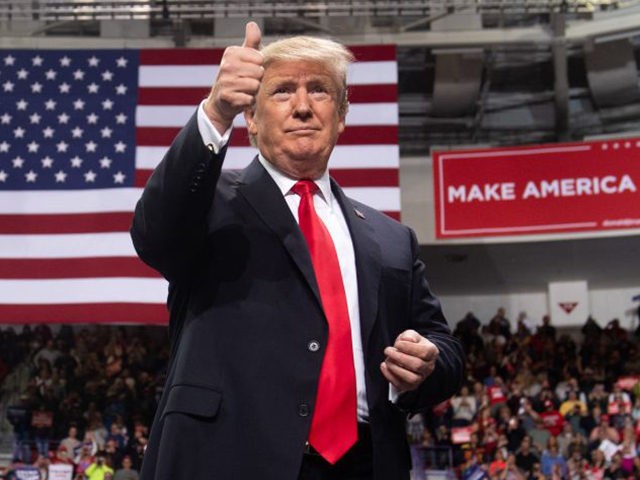Progressives are complaining that President Donald Trump dramatically increased his share of the male black vote, from roughly 13 percent to 18 percent, according to the exit polls.
“This is so personally devastating to me: the black male vote for Trump INCREASED from 13% in 2016 to 18% this year,” tweeted New York Times columnist Charles Blow. “The black female vote for Trump doubled from 4% in 2016 to 8% this year.”
Overall, Trump scored 12 percent of the block vote, up from 8 percent in 2016, amid intense and emotional efforts by Democrats and progressives to minimize the GOP’s share of the vote.
Democrats still got 87 percent of the black vote, but in a follow-up tweet, Blow lamented that the GOP’s share of black men is steadily rising:
It’s the undeniable trend that’s devastating. Black men voting for the Republican candidate: 2008, McCain, 5% 2012, Romney, 11% 2016, Trump, 13% 2020, Trump, 18%
“The reason why you see white men, brown men, Black men, all voting at higher rates for Trump than the women in each category, frankly, is his appeal to a chauvinism, to machismo, to patriarchy, by whatever name you call it,” Ben Jealous, the former head of the NAACP group told Yahoo.com.
GOP advocates credit the president’s economic performance — including higher wages, lower unemployment, and lower immigration — for raising the GOP’s black vote. Yahoo noted:
Celebrities like Lil Wayne, 50 Cent, and Ice Cube have all voiced support for President Trump or his policies, citing his “Platinum Plan” — Trump’s “promise” to Black America and his tax policies which they say are better for higher bracket earners than Biden.
On October 29, Breitbart reported gains for black Americans under Trump, noting that:
The poverty rate for black Americans fell by 0.9 percentage points and by 0.8 percentage points for Hispanic Americans in 2018, the latest year for which data are available. Those figures represent, for both groups, the lowest levels of poverty ever recorded by the Census Bureau.
Still, the GOP share of the black vote fell short of hopes by many advocates.
Nasheed Tariq, a California-based advocate for black Americans, says Trump’s score among black voters rose because of GOP-leaning black immigrants. “Most of those guys come from the Caribbean, a lot come from West Africa … and also down in Miami … [the] black groups who actually support Trump are actually black immigrants,” he told Breitbart News.
Nasheed is an advocate for blacks whose ancestors were enslaved, whom he describes as “Foundational Black Americans.” Many of these American blacks declined to vote for Joe Biden or for Trump, partly because neither candidate offered a direct economic benefit to the black voters, Nasheed said.
“He hasn’t given any policies that directly harm black people. He hasn’t put together too many policies that directly harm black people … But for the most part, he didn’t do it. Biden had a whole law, the ’94 crime bill, and so the other crime bills that he put together, or he was a part of, that directly harmed black people in very, very large numbers. And also with [Sen.] Kamala Harris [D-CA], with her record out here in California, her policies directly harmed black people in large numbers. Foundational black Americans looked at it as the lesser of the evils, and, you know, we got a lot of us decided to just sit it out.”
Trump’s economy was not directly aimed at helping blacks, Nasheed said. Trump’s curb on immigration “was somewhat of a positive,” he said. “There were a few things that, indirectly, we as Foundational Black Americans, we saw as a secondary benefit. which was cool. But as far as direct benefits, we didn’t see anything from that. The secondary gain and benefits were something that was minor,” he said.
The exit poll data comes from an exit survey funded by multiple media outlets. According to CNN, the exit polls:
…are a combination of in-person interviews with Election Day voters and telephone polls measuring the views of absentee by-mail and early voters, and were conducted by Edison Research on behalf of the National Election Pool. In-person interviews on Election Day were conducted at a random sample of 115 polling locations nationwide among 7,774 Election Day voters. The results also include 4,919 interviews with early and absentee voters conducted by phone.
“Results for the full sample have a margin of error of plus or minus 2 percentage points; it is larger for subgroups,” CNN continued.

COMMENTS
Please let us know if you're having issues with commenting.